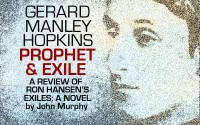Magazine > Culture
Damien Hirst: The Death of Art Explained
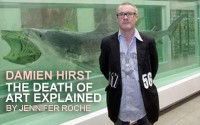 As Wall Street tanks, the Art Market soars. The Damian Hirst auction at Sotheby’s London (Sept. 15-16, 2008) raked in $198 million (£111 million), creating a new jaw-dropping record for a one-artist sale. Hirst’s own record for the highest price he has yet fetched for one of his pieces was also surpassed at this sale with a whopping $18.8… READ MORE >
As Wall Street tanks, the Art Market soars. The Damian Hirst auction at Sotheby’s London (Sept. 15-16, 2008) raked in $198 million (£111 million), creating a new jaw-dropping record for a one-artist sale. Hirst’s own record for the highest price he has yet fetched for one of his pieces was also surpassed at this sale with a whopping $18.8… READ MORE >
Opinion > Culture
Tom Stoppard, Freedom Fighter
 Tom Stoppard, the witty British playwright most famous for his mind-bending twist on Hamlet, Rosencrantz and Guildenstern Are Dead, is the feature of an Observer article on human rights. Stoppard’s plays are like Samuel Beckett by way of Oscar Wilde, with detours to Bardland—postmodern riffs on Big Themes like love and death and liberty,… READ MORE >
Tom Stoppard, the witty British playwright most famous for his mind-bending twist on Hamlet, Rosencrantz and Guildenstern Are Dead, is the feature of an Observer article on human rights. Stoppard’s plays are like Samuel Beckett by way of Oscar Wilde, with detours to Bardland—postmodern riffs on Big Themes like love and death and liberty,… READ MORE >
Opinion > Culture
Adam and Eve make a stand in California
 You connect the dots: A California couple refuses to submit to the state’s new “gender-neutral” marriage license that replaces bride and groom with “Party A” and “Party B.” Buried within a Scientific American article on storytelling and the brain (cited by John Murphy below) is a fascinating discovery made by “literary Darwinists”… READ MORE >
You connect the dots: A California couple refuses to submit to the state’s new “gender-neutral” marriage license that replaces bride and groom with “Party A” and “Party B.” Buried within a Scientific American article on storytelling and the brain (cited by John Murphy below) is a fascinating discovery made by “literary Darwinists”… READ MORE >
Opinion > Culture
Vatican Searching for Next Raphael. Or Roy Lichtenstein?
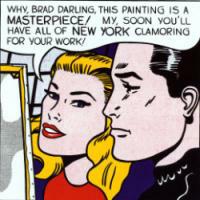 The Catholic Church used to be Western Civ's pre-eminent patron of art and architecture. But the past few hundred years have seen the Vatican slowly transition from commissioner to collector, safeguarding the long and luminous tradition of Church art. Tantalizing signs of change are looming, however. Newsweek is reporting on the Vatican's… READ MORE >
The Catholic Church used to be Western Civ's pre-eminent patron of art and architecture. But the past few hundred years have seen the Vatican slowly transition from commissioner to collector, safeguarding the long and luminous tradition of Church art. Tantalizing signs of change are looming, however. Newsweek is reporting on the Vatican's… READ MORE >
Opinion > Culture
#110 Stuff White People Like
 The Atlantic has an interesting commentary on the popular blog site, Stuff White People Like (also now a New York Times bestselling book). The website features mini-essays by Christian Lander, a PhD dropout now famous for skewering the tastes and mores of ‘White People’—alternately called ‘bourgeois bohemians’ and… READ MORE >
The Atlantic has an interesting commentary on the popular blog site, Stuff White People Like (also now a New York Times bestselling book). The website features mini-essays by Christian Lander, a PhD dropout now famous for skewering the tastes and mores of ‘White People’—alternately called ‘bourgeois bohemians’ and… READ MORE >
Opinion > Culture
David Foster Wallace, postmodern moralist, dead at 46
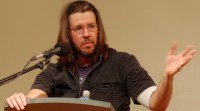 The apparent suicide of David Foster Wallace, the prodigiously talented author of the novel Infinite Jest, is a sad, stunning end for a writer whose best work burst with unflagging energy and propulsive imagination. Though often lumped with postmodernists like Thomas Pynchon, Wallace's fiction had a deeply-felt humanity and breadth-of-scope… READ MORE >
The apparent suicide of David Foster Wallace, the prodigiously talented author of the novel Infinite Jest, is a sad, stunning end for a writer whose best work burst with unflagging energy and propulsive imagination. Though often lumped with postmodernists like Thomas Pynchon, Wallace's fiction had a deeply-felt humanity and breadth-of-scope… READ MORE >
Magazine > Culture
Gerard Manley Hopkins: Prophet & Exile
Magazine > Culture
Beauty Goes Underground
 Would St. Augustine ever have experienced his conversion sitting in a pew being subjected to an off-key rendering of “On Eagle’s Wings”? READ MORE >
Would St. Augustine ever have experienced his conversion sitting in a pew being subjected to an off-key rendering of “On Eagle’s Wings”? READ MORE >
News > Culture
The last rendezvous with Arthur C. Clarke
 “…Clarke, who is credited in real life with being the first to come up with the idea of an ‘artificial satellite’ that could ‘broadcast to half the globe,’ was nothing if not prescient. Two years before I was born, he had already grasped the inevitable, unstoppable business model of on-demand-sex-flicks in the privacy of your own living room [and] I mean, come on -- in 1960, Clarke had already sketched out ‘Queer Eye for the Straight Guy.’ Were there no limits to his imagination!?” READ MORE >
“…Clarke, who is credited in real life with being the first to come up with the idea of an ‘artificial satellite’ that could ‘broadcast to half the globe,’ was nothing if not prescient. Two years before I was born, he had already grasped the inevitable, unstoppable business model of on-demand-sex-flicks in the privacy of your own living room [and] I mean, come on -- in 1960, Clarke had already sketched out ‘Queer Eye for the Straight Guy.’ Were there no limits to his imagination!?” READ MORE >
News > Culture
The Redemption of Chris Rose
“Chris Rose, a columnist for the daily Times-Picayune, was once known primarily for reporting on the bad behavior of visiting celebrities. Hurricane Katrina changed that: it transformed Rose into a plaintive voice for a struggling city. His columns detailed the emotional toll of living amid still-flatted houses and daily reminders of the 1,500 who died in the storm’s aftermath. And then, more than a year after the breached levees plunged whole districts underwater, Rose was sharing with readers the story of his own descent…” READ MORE >
News > Culture
Q&A on William F. Buckley
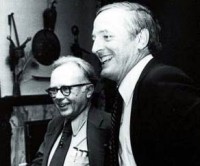 Sam Tanenhaus ... is writing a biography of William F. Buckley Jr., who died Wednesday. Q: What is the most surprising discovery you’ve made while working on this biography of William F. Buckley Jr.? ... A: There were two. First, he would rather talk about almost anything other than politics — literature, music, sailing, music. He once told me, 'I only talk about politics when someone pays me to do it.' Second, I never heard him make a personally disparaging remark about anyone, even adversaries like Arthur M. Schlesinger Jr. and Gore Vidal. He might describe something they did or the style in which they did it, but never in an insulting or even critical way. He had a large sense of the human comedy... Q: What was Buckley’s view of the current Bush administration? A: He was most distressed by it and once said if the United States had a parliamentary system, President Bush would be subject to a “no confidence” vote. He was highly critical of the war in Iraq and wrote eloquent columns on the subject in his last years." READ MORE >
Sam Tanenhaus ... is writing a biography of William F. Buckley Jr., who died Wednesday. Q: What is the most surprising discovery you’ve made while working on this biography of William F. Buckley Jr.? ... A: There were two. First, he would rather talk about almost anything other than politics — literature, music, sailing, music. He once told me, 'I only talk about politics when someone pays me to do it.' Second, I never heard him make a personally disparaging remark about anyone, even adversaries like Arthur M. Schlesinger Jr. and Gore Vidal. He might describe something they did or the style in which they did it, but never in an insulting or even critical way. He had a large sense of the human comedy... Q: What was Buckley’s view of the current Bush administration? A: He was most distressed by it and once said if the United States had a parliamentary system, President Bush would be subject to a “no confidence” vote. He was highly critical of the war in Iraq and wrote eloquent columns on the subject in his last years." READ MORE >
News > Culture
The ‘Problem of Evil’ in Postwar Europe
“After 1945 our parents' generation set aside the problem of evil because —for them—it contained too much meaning. The generation that will follow us is in danger of setting the problem aside because it now contains too little meaning. How can we prevent this? How, in other words, can we ensure that the problem of evil remains the fundamental question for intellectual life, and not just in Europe? I don't know the answer but I am pretty sure that it is the right question.” READ MORE >
News > Culture
Bible as Graphic Novel, With a Samurai Stranger Called Christ
“In a blurb for the Manga Bible, which is published by Doubleday, the archbishop of Canterbury, the Most Rev. Rowan Williams, is quoted as saying, ‘It will convey the shock and freshness of the Bible in a unique way.’ No doubt. In the Manga Bible, whose heroes look and sound like skateboarders in Bedouin gear, Noah gets tripped up counting the animals in the Ark: “That’s 11,344 animals? Arggh! I’ve lost count again. I’m going to have to start from scratch!” READ MORE >
News > Culture
Reaching Out to Moderate Muslims is Smart
“Daniel Pipes has suggested that ‘mak[ing] a distinction between the mainstream Islamists and the fringe ones [is] like making a distinction between mainstream Nazis and fringe Nazis. They’re all Nazis, they’re all the enemy.’ Is this the case? Suppose that, to continue Pipes’s analogy, there had been Nazis who clearly rejected violence, as some who call themselves Islamists have done. Would they not have been meaningfully distinguishable from Hitler’s crew? An anathema so sweeping as Pipes’s can lead to classifying individuals or groups wrongly, or overlooking important transformations in attitude… [R]adical Islamism is a fragile and perishable ideology, and, unless we surrender, there is little possibility that it will triumph. The only question is how much damage it will do before it implodes… anyone who can help us to forestall the worst is worth our trouble to cultivate.” READ MORE >
News > Culture
What’s Behind Steroids? A Culture of Fear
"We must openly address not only the drug issues plaguing the sports we love, but the culture of fear that shakes our society... We’re scared of failure, aging, vulnerability, leaving too soon, being passed up — and in the quest to conquer these fears, we are inspired by those who do whatever it takes to rise above and beat these odds. We call it 'drive' or 'ambition,' but when doing 'whatever it takes' leads us down the wrong road, it can erode our humanity. The game ends up playing us..." READ MORE >
News > Culture
Scholar sees a Catholic in the Bard
 Another book arguing that Shakespeare’s plays were written from a Catholic perspective. It’s too bad, but until there’s hard evidence that Shakespeare was a practicing Catholic, the literary establishment will keep ignoring these books. The best one so far is Claire Asquith’s Shadowplay.
READ MORE >
Another book arguing that Shakespeare’s plays were written from a Catholic perspective. It’s too bad, but until there’s hard evidence that Shakespeare was a practicing Catholic, the literary establishment will keep ignoring these books. The best one so far is Claire Asquith’s Shadowplay.
READ MORE >
Page 1 of 1 pages


